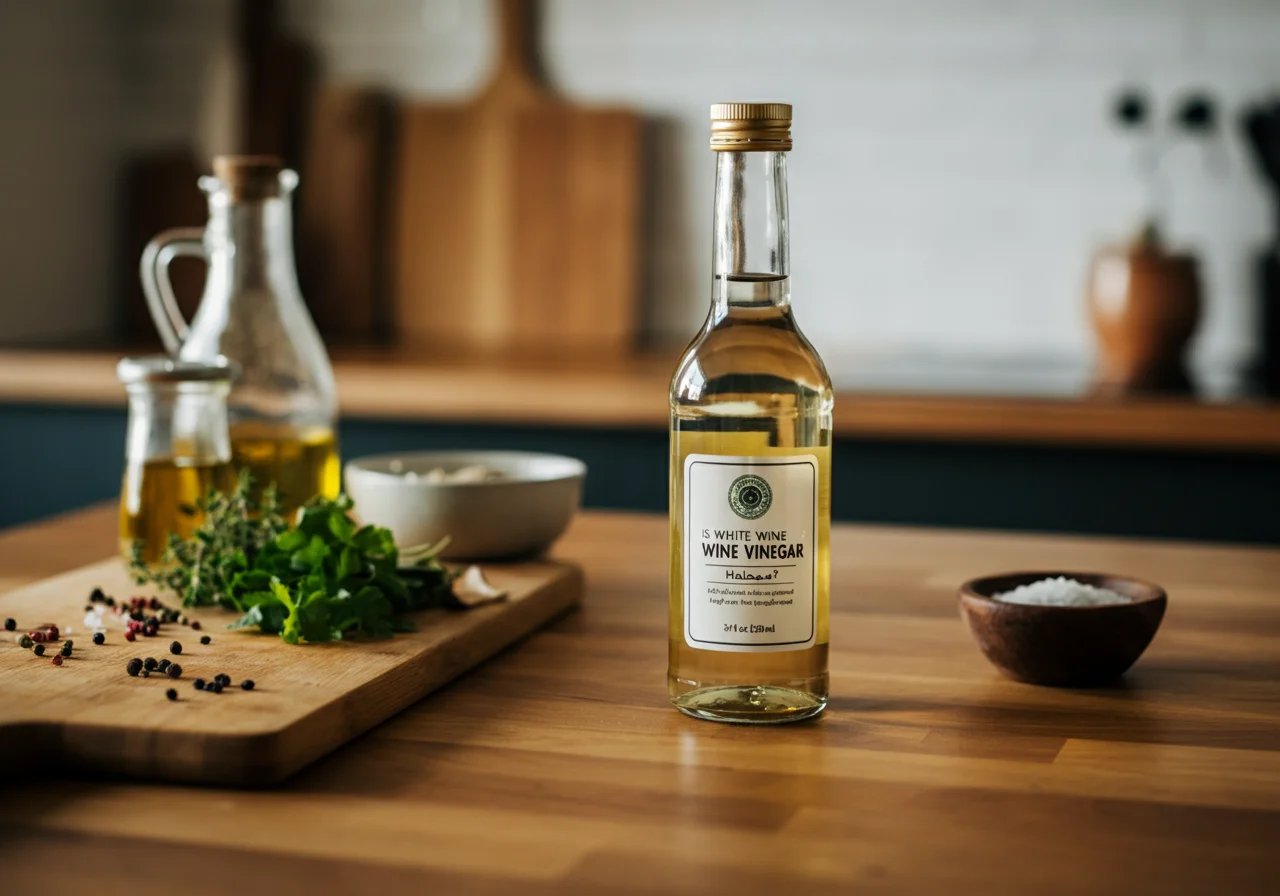For those who follow Islamic dietary laws, determining which foods and ingredients are permissible can sometimes feel like navigating a maze. Is white wine vinegar halal? This question comes up frequently, especially when you spot “wine” in the ingredient name and know that alcohol is strictly prohibited in Islam. The short answer is nuanced, and understanding the reasoning behind it requires a closer look at both Islamic principles and how white wine vinegar is actually made.
In this guide, we’ll explore the halal status of white wine vinegar, examine what Islamic scholars say about it, and provide practical tips for making informed choices in your kitchen.
Understanding Halal and Haram in Islamic Dietary Law
In Islam, halal refers to what is permissible or lawful, while haram describes what is forbidden. These terms apply to all aspects of life, but they’re particularly important when it comes to food and drink.
The Quran clearly prohibits the consumption of alcohol and intoxicants. This prohibition is absolute and applies to all beverages and foods that can cause intoxication. However, Islamic dietary law also recognizes that substances can undergo transformations that change their legal status. This concept becomes relevant when discussing vinegar derived from alcoholic sources.
Muslims are encouraged to seek knowledge about what they consume and to prioritize halal options whenever possible. This isn’t just about following rules—it’s about maintaining spiritual purity and demonstrating obedience to God’s commands.
What Exactly Is White Wine Vinegar?
White wine vinegar is a popular ingredient in salad dressings, marinades, and sauces. It’s made through a two-step fermentation process that begins with white wine.
First, yeast converts the sugars in grapes into alcohol, creating wine. Then, acetic acid bacteria (often called “mother of vinegar”) convert that alcohol into acetic acid through a second fermentation. This acetic acid gives vinegar its characteristic sour taste and pungent smell.
The key question for Muslims is whether this transformation from alcohol to vinegar makes the final product halal, despite its alcoholic origins.
The Islamic Perspective on Vinegar from Alcohol
Islamic scholars have debated the permissibility of vinegar made from wine for centuries, and their conclusions offer important guidance.
Natural Transformation vs. Intentional Production
Most classical and contemporary scholars agree that if wine or another alcoholic beverage naturally transforms into vinegar without human intervention, the resulting vinegar is halal. This is based on the principle that the substance has fundamentally changed—it’s no longer intoxicating and has become something entirely different.
The Prophet Muhammad (peace be upon him) reportedly said, “What a good condiment vinegar is.” This hadith is often cited as evidence that vinegar itself is permissible, even when derived from wine.
However, scholars differ on whether vinegar that’s intentionally produced from wine (as white wine vinegar typically is) holds the same status. Some argue that deliberately using wine as a starting material is problematic, while others maintain that the chemical transformation renders the final product permissible.
The Hanafi School’s Position
The Hanafi school of Islamic jurisprudence generally considers wine vinegar permissible, whether the transformation happened naturally or through human intervention. Their reasoning focuses on the fact that the intoxicating properties have been completely eliminated.
Other Schools of Thought
The Shafi’i, Maliki, and Hanbali schools tend to be more cautious. Many scholars from these schools permit naturally transformed vinegar but express reservations about vinegar intentionally produced from wine. Some distinguish between vinegar made by Muslims (which they may view as problematic) versus vinegar made by non-Muslims (which they may permit).
Factors That Determine Halal Status
Several practical considerations affect whether a specific bottle of white wine vinegar can be considered halal.
Residual Alcohol Content
During the vinegar-making process, most alcohol converts to acetic acid. However, trace amounts of alcohol (typically less than 0.5%) may remain in the final product. Many scholars consider these negligible amounts permissible, as they’re not enough to cause intoxication and are naturally present in many foods, including bread and ripe fruit.
Production Methods
Some manufacturers use starting materials other than actual wine to create “white wine vinegar.” They might ferment grape juice or use alcohol derived from halal sources. These production methods would generally make the product more clearly permissible.
Halal Certification
The most reliable way to determine if white wine vinegar is halal is to look for certification from a recognized Islamic authority. Certifying bodies conduct thorough investigations into ingredients, production processes, and potential cross-contamination before granting halal status.
How to Identify Halal White Wine Vinegar
If you want to use white wine vinegar while staying within halal guidelines, here are some practical steps:
Check for halal certification marks on the label. Look for logos from recognized certifying organizations such as the Islamic Food and Nutrition Council of America (IFANCA), Halal Certification Services, or similar bodies in your country.
Read ingredient lists carefully. Some products labeled “white wine vinegar style” or “white wine-flavored vinegar” may actually be made from halal sources like grain alcohol or direct fermentation of grape juice.
Contact the manufacturer if certification isn’t clearly displayed. Many companies can provide information about their production methods and whether their products meet halal standards.
Research the brand. Some companies specifically cater to Muslim consumers and clearly advertise their halal credentials.
Halal Vinegar Alternatives
If you’re uncertain about white wine vinegar or simply prefer to avoid it, several excellent alternatives work well in recipes:
Apple cider vinegar is made from fermented apple juice and is widely considered halal. It has a slightly fruity flavor that works beautifully in dressings and marinades.
White vinegar (also called distilled vinegar) is typically made from grain alcohol and is generally halal. It has a clean, sharp taste.
Rice vinegar is common in Asian cooking and is usually halal. It’s milder and slightly sweet compared to white wine vinegar.
Lemon or lime juice can substitute for vinegar in many recipes, providing acidity and brightness without any concern about source materials.
When substituting, use equal amounts of these alternatives in place of white wine vinegar. You may need to adjust slightly based on your taste preferences, as each vinegar has its own flavor profile.
Making Informed Choices About Halal Foods
The question of whether white wine vinegar is halal doesn’t have a one-size-fits-all answer. Islamic scholarship offers different perspectives, and the production method of the specific product matters.
For those who follow more cautious interpretations, seeking halal-certified products or using alternative vinegars provides peace of mind. For those who follow scholars who permit wine vinegar based on its transformation, standard white wine vinegar may be acceptable.
What matters most is making an informed decision based on reliable sources and your own understanding of Islamic dietary law. Consult with knowledgeable scholars if you’re uncertain, and prioritize products with clear halal certification when possible.
Remember that adhering to halal dietary practices is part of living a life aligned with Islamic values. Whether you choose to use white wine vinegar or opt for alternatives, your intention to follow halal guidelines is what counts most.

